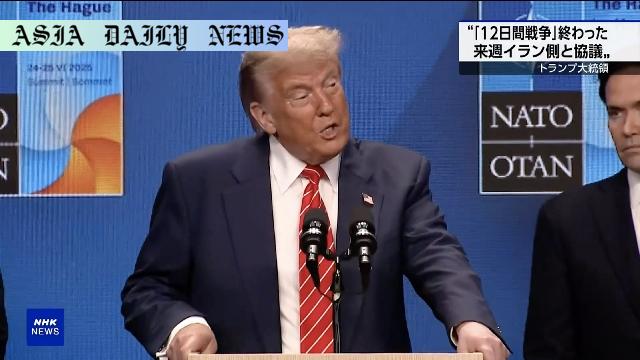US-Iran talks. President Trump announced that after a brief war between Israel and Iran, the US plans to engage with Iran next week, indicating progress towards peace by signing a potential agreement.
US President Trump announced the end of the Israel-Iran 12-day war and claimed exhaustion on both sides.
US plans to engage in talks with Iran next week, with the possibility of signing a peace agreement.
Trump emphasized the US goal of ensuring Iran remains non-nuclear.
Ceasefire stability is under scrutiny after drone interceptions by Israel from sources linked to Iran and Yemen.

Introduction to the 12-Day War
The United States President Donald Trump, during the NATO summit in The Hague, revealed that the 12-day conflict between Israel and Iran has reportedly come to an end. Declaring that both nations are tired and exhausted from prolonged fighting, Trump stated the US’s intention to initiate talks with Iran in the upcoming week. This announcement highlights a significant diplomatic effort to restore peace in the volatile Middle East region. The war started on June 13 when Israel launched attacks targeting Iran. However, specific details of the operations remain undisclosed.
US Plans for Diplomatic Engagement
During the news conference, President Trump mentioned his administration’s long-term goal of ensuring Iran’s nuclear disarmament. He stressed that any agreement during these talks would center around the single demand for Iran to remain non-nuclear. Talks with Tehran have been on hold since the conflict began, marking a potentially impactful diplomatic effort to de-escalate tensions between the two nations. Trump also hinted at the possibility of signing an agreement with Iran during these discussions.
Factors Surrounding the Ceasefire
The recent cessation of violence between Israel and Iran has provided a fragile foundation for diplomatic progress. While President Trump affirmed that both parties are likely to uphold the ceasefire due to their exhaustion from combat, recent developments cast uncertainty on whether this peace will be maintained. On Tuesday, Israel intercepted drones allegedly launched by Iran and Yemen, raising concerns about the stability of the truce.
The Importance of Addressing Regional Stability
This conflict has underscored the necessity of addressing broader regional stability in the Middle East. By positioning the United States as a mediator, Trump’s administration aims to leverage its influence in fostering long-term peace solutions. However, the challenges that lie ahead are considerable. Issues such as proxy conflicts, political differences, and military threats could hinder progress in the region.
Conclusion
The progress toward US-Iran talks signifies a ray of hope amidst the tumultuous events in the Middle East. The potential for a diplomatic agreement aligned with the goal of nuclear disarmament could set a precedent for addressing broader regional conflicts. However, the stability of the ceasefire remains uncertain, highlighting the necessity for sustained diplomatic efforts and careful negotiation strategies. As the world awaits the outcomes of the impending talks, the focus remains on whether this step will prove to be a turning point in the pursuit of lasting peace.



Commentary
Significance of US-Iran Talks
The announcement of upcoming US-Iran talks following the 12-day war between Israel and Iran is significant on multiple levels. First, it represents a small but critical step towards de-escalating a historically tense relationship in the Middle East. By initiating dialogue, the US is not only signaling its commitment to global diplomacy but also attempting to stabilize one of the most politically volatile regions in the world. This intervention demonstrates the impact of strategic mediation by a superpower in resolving international conflicts.
Challenges in Sustaining Peace
Despite the optimistic tone struck by President Trump, several challenges lie on the horizon. The ceasefire’s fragility, exemplified by Israel’s interception of drones linked to Iran and Yemen, underscores the region’s volatile security landscape. Beyond military issues, deep-seated political animosities and longstanding disputes over sovereignty and territory are potential stumbling blocks. For any agreement to prove durable, it must address these structural issues that have perpetuated cycles of violence for decades.
The Broader Implications
Should the US and Iran succeed in reaching an agreement, the broader implications could be transformative. Beyond pacifying Israel-Iran tensions, a successful dialogue may pave the way for resolving other disputes in the Middle East, be it through direct negotiations or multilateral initiatives. Moreover, it could alter Iran’s engagement with the global community, potentially opening avenues for increased economic and political cooperation. For the US, a diplomatic accomplishment in Iran could enhance its leadership credibility on the world stage.
Conclusion
While the news of upcoming US-Iran talks represents a positive development, it is far from the end of the story. The complex geopolitical dynamics of the Middle East require sustained, strategic commitment from all parties involved. As we await the outcomes of next week’s negotiations, there is cautious optimism that this moment could be a turning point in addressing not only the Israel-Iran conflict but also the broader challenges in the region.